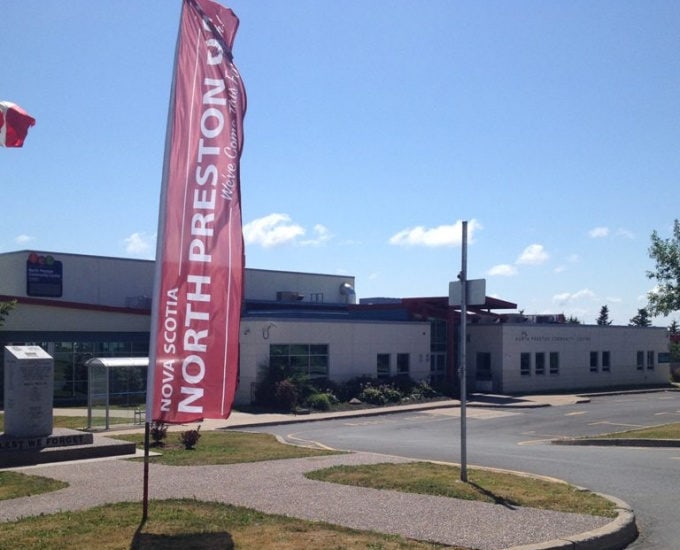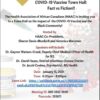
KJIPUKTUK (Halifax) – Without a doubt one of the most inspiring stories to emerge from the pandemic is how the Preston communities mobilized to protect residents from infection. Even more amazing when you consider how all this happened while residents were accused of being careless spreaders, more interested in partying than in their fellow humans.
Initiated and led by young people, and supported by community members with healthcare backgrounds, there is no doubt their tireless efforts saved many lives.
That mobilization continues to this day, and extends into Black communities across Nova Scotia. Tomorrow, Friday January 15, the Health Association of African Canadians (HAAC) is holding an African Nova Scotian COVID-19 vaccine town hall: Fact vs Fiction.
We spoke with two people directly associated with the town hall. Dr. David Haase is past President and a member of HAAC , and a retired infectious disease doctor. Sharon Davis-Murdoch is Co-President and a founding member of HAAC.
Also included in the conversation was Archy Beals, a community activist. Archy was deeply involved with the community mobilization in the Prestons early on in the pandemic.
We talked about much more than just tomorrow’s town hall. Why did the community lead the response to the COVID-19 crisis more so than formal healthcare resources? What made their response so successful? and how could the formal health system better support these responses? These are some of the questions we tackled during the interview. Casting a shadow on the entire conversation: what is the role of systemic racism in all this?
First, let’s talk a bit about the early community mobilization against COVID-19.
Archy: It’s really important to emphasize that the work in the Preston townships was started by a group of young people who recognized that COVID was coming to the community, and mobilized and made the connections. They pulled in resources like the Department of Community Services, HAAC, and the Association of Black Social Workers. It was a team effort by the entire township, started by young people in the community, and supported by health professionals who had the trust of the community and who knew the community.
See also: Miranda Cain on COVID-19 and the Prestons: “The little we do have, we have done it ourselves”
Dr. David: There was foresight in the mobilization with the young people. For example, they insisted to public health officials that we needed to have a mobile testing site in our community. Let’s not have a site where people have to travel out, bring the test site to us here, they said. Eventually they even did door to door testing. That to me is an outstanding example of how things worked. As health professionals we were members of a team who had the trust of the community, who knew the community.
Sharon: Look at the marvelous response that we have been able to muster in Nova Scotia. I think we set a precedent for the world. Politics is local, action is local, and then it can exponentially spread. What was done can be repeated. For us it underscored the importance of culturally specific, culturally competent approaches. One size will never fit all. That has been the HAAC mantra for going on 21 years now. And we have proven it again through the experience of COVID-19.
Why the need for a town hall on the vaccine, and what is the significance that again this is initiated by the African Nova Scotian community.
Sharon: I do want to emphasize that this has been something that HAAC has been doing all along. There was a lot of misinformation about COVID-19 going around in March. Very early on, on March the 20th, even before the province had called a state of emergency, we had our first town hall on zoom, and then we did it again, on March the 27th.
Since then we had two more town halls, so this one about the vaccine will be the fifth town hall. We see things coming, we always have, and we recognize that we need to move forward and engage our people in discussion about our health. Because as much as we would like the government to come up beside us, it hasn’t made that same commitment to cultural specificity that is so important. So it’s up to us to do it. That said, funding for our comprehensive efforts came through the government, and we are appreciative of that, and I don’t want there to be any sense that that didn’t happen.
Dr David: We are hoping, as Sharon said, that the health system will come alongside and help to develop those culturally specific messages. We need not just a town hall, but an entire campaign that gets the message about the importance of the vaccine out to all our Black communities.
Sharon: HAAC always emphasizes that when we talk about people of African ancestry in Nova Scotia, we talk about multiple communities, not a single homogeneous community. And cultural competence means addressing the needs of each community, with its own requirements, its own culturally specific lived experience. There are immigrants, there are people who speak multiple languages who need to be reached, there are people in urban centers, there are people in rural Nova Scotia, there are people who have been born in Nova Scotia. People have very different experiences, even within the Preston Townships one group is not the same as the other.
What’s the role of systemic and structural racism in all this?
Sharon: First of all, In Nova Scotia, in Canada, and across the African diaspora we have been disproportionately impacted because of the way structural racism affects us. For example, we are vulnerable to infection based on the kinds of work that we are involved in. Often we are on the front lines, whether that’s in public transportation, in grocery stores, etc. Just think also about the number of people who have been infected because of their connection to caregiving. Also, in long term care in Nova Scotia, and across the African diaspora, it’s Black, Brown, and immigrant people, marginalized people all, who are on the front lines. In addition, Black people are particularly at risk because of the number of chronic diseases that they often are coping with. And so all of that is our reality.
Dr David: One of the issues we keep beating the drum about is the need for health data by race and ethnicity. One of the things that the US has done very well, and other countries as well, is that they have been able to collect this data. It’s very clear that people in the Black communities, for instance are having poor outcomes with COVID infection. And again, having the data would allow us to better understand the reasons for that. We have some anecdotal evidence, and some provinces have already started collecting this data in Canada.
Archy: The community was named and shamed by the premier. Dr. Strang emphasized the importance of not naming anyone, but there was never an apology given to the community. As a result of all of this there were people who blamed the community for bringing Covid to Halifax. I know people who work in healthcare who had to take time off work because of the pressure and the stress that they felt as a result of what was said on social media. It not only impacted them financially, but it also impacted them when it comes to their health.
See also: Dr. OmiSoore Dryden: Why would African Nova Scotians trust the health system?
With a special thanks to our generous donors who make publication of the Nova Scotia Advocate possible.
Subscribe to the Nova Scotia Advocate weekly digest and never miss an article again. It’s free!



